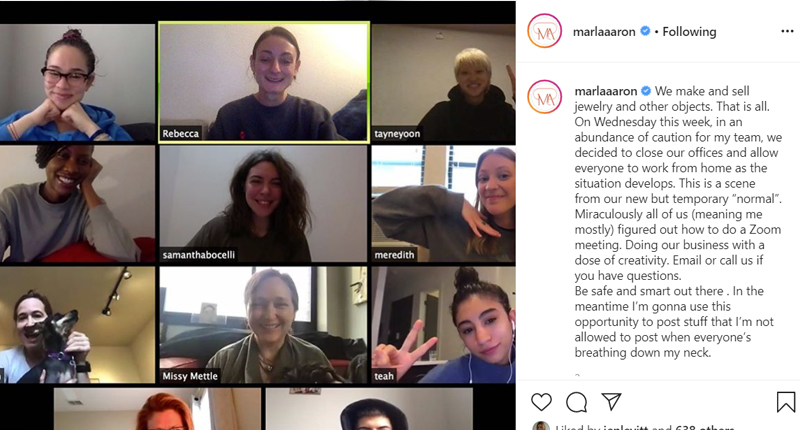“Shell Auranova” is the next generation of the brand’s bridal line, featuring half-bezel engagement rings with bold and fluid designs.
5 Tips on Public Relations During a Crisis From an Expert
Now is not the time to stop communicating, says Cindy Krupp.

New York—Cindy Krupp may have more than 20 years of public relations experience, but she’s the first to admit that the coronavirus poses challenges unlike any she’s experienced.
“It’s unprecedented,” the PR and luxury veteran said of the pandemic that’s halted trade shows and shut down jewelry production across the United States. “I keep saying to my clients, I have no prior experience to pull from [in this scenario].”
Therein lies Krupp’s first piece of advice she shared with National Jeweler for navigating a crisis: When faced with unusual circumstances, take a breath. Then, listen.
1. Don’t Be Tone-Deaf
Krupp, founder of public relations and brand strategy firm Krupp Group, which works with fine jewelry brands such as Foundrae, Eva Fehren and Sylva & Cie in addition to ready-to-wear fashion brands, said the first thing her team did as coronavirus began disrupting businesses was take a step back and really listen to consumers.
“Listen to what your customers are saying,” she advised. “A sense of camaraderie and transparency is really what people are desiring now from the brands they rely on for enjoyment, pleasure and comfort.”
That means addressing the elephant in the room. To carry on with regular brand messaging via social media and other marketing channels would feel disingenuous when the world is reeling from the impact of a pandemic.
“I know everyone wants to not call out COVID-19 because it feels taboo, but people won’t respect a brand that can’t acknowledge that we’re all in this together,” Krupp explained.
That also means refraining from content that could be deemed insensitive or out-of-touch.
“Don’t be tone-deaf. Be thoughtful. Listen and communicate in a candid, transparent way because no one wants bullshit right now. That’s really how we are guiding our brands and clients with how to handle communications.”
2. Transparency Is Key
On that note, be honest and up front in how coronavirus is impacting your business, said Krupp.
“Talk about what you’re doing, that you appreciate [your customers’] loyalty and support and describe what business looks like in this time frame.”
Whether that’s closing stores, or limiting or halting shipping, use your marketing platforms to communicate logistical limitations.
If you don’t have PR or rely on an in-house team, be sure to run these communications by someone you trust before posting.
Part of what Krupp Group does is help its clients
3. Keep the Content Coming
No matter the capabilities of your business, the worst thing a brand can do is stop communication.
“I keep telling my clients, don’t go dark. I know a lot of people are feeling fear and when you feel fear you want to contract and go dark but I’m not allowing my clients do that.”
Even if messaging is less frequent than when a business had full staffing or regular content creation capabilities, regular social media posts and e-mails are essential to weathering a storm.
“The brands that continued conversations with customers, influencers and media are the ones who are going to be able to pick back up quickly and take steps forward [when this is over]. Going dark is the worst thing you could do right now.”
Plus, your audience hasn’t gone anywhere.
“People are more digitally tuned in right now than they’ve ever been,” Krupp noted.
4. Think Short-Term
With COVID-19’s impact constantly changing and evolving, Krupp and her team are checking in with clients regularly to reassess their status in real time.
With any type of unfamiliar crisis, Krupp advises brands to stay flexible by not thinking too far ahead.
Instead, focus on short-term strategy, assessing, “this week, next week, that’s it,” Krupp said.
Coming up, Krupp anticipates, “there’s going to be a ton of spring merchandise and we’re going to need to push people to brands’ ecommerce really fast.”
Brands should continuously adapt their marketing focus on what they need to sell and what they can deliver to customers as quarantines continue and, eventually, end.
“The brands that continued conversations with customers, influencers and media are the ones who are going to be able to pick back up quickly and take steps forward [when this is over]. Going dark is the worst thing you could do right now.” – Cindy Krupp, Krupp Group
Krupp’s clients are showing that people are still buying jewelry, so brands need to be strategic about what they promote to offset damage.
“Our jewelry brands are still seeing sales. No one has said they’re having a banner month but it’s still trickling in a little bit. Retail therapy is a real thing. The value of gold is great and strong and if [customers] took some cash out of the market and want to make a purchase that will maintain or increase value and want to enjoy it in the meantime, then gold is a great thing to purchase.
“We’re not cancelling birthdays and graduation gifts.”
5. Keep Pitching
While media is not immune to a poor economy, journalists and editors still need content.
Krupp said her firm has been getting consistent press for its clients during quarantine.
While magazine photo shoots might be currently out of the question, jewelry hi-res product imagery is all that’s required for plenty of digital and print features.
And don’t forget the power of influencers—they need content too.
“Social media influencers feel like a lifeline because they can push out really good content on their own quickly, so we’re able to ship them product directly from brands, and they’re able to shoot it and post.”
The Latest

Boucheron and Pomellato performed well in an otherwise bleak quarter for Kering amid struggles at Gucci.

Designer Deborah Meyers created her birds from oxidized sterling silver, rose-cut diamond eyes, and Akoya Keshi pearl feathers.

Six new retail businesses were selected for the 2025 program, which began in January.

The company said it expects sightholders to remain “cautious” with their purchasing due to all the unknowns around the U.S. tariffs.


Sponsored by the Gemological Institute of America

Simon Wolf shares why the time was right to open a new office here, what he looks for in a retail partner, and why he loves U.S. consumers.

The risk of laboratory-grown diamonds being falsely presented as natural diamonds presents a very significant danger to consumer trust.

The company failed to file its quarterly reports in a timely manner.

The organization also announced its board of directors.

Charms may be tiny but with their small size comes endless layering possibilities, from bracelets to necklaces and earrings.


Located in Valenza, the now 355,000-square-foot facility includes a new jewelry school that’s open to the public, Scuola Bulgari.

Paola Sasplugas, co-founder of the Barcelona-based jewelry brand, received the Fine Jewelry Award.

A platinum Zenith-powered Daytona commissioned in the late ‘90s will headline Sotheby’s Important Watches sale in Geneva next month.

The basketball stars wear men’s jewelry from the “Curb Chain” collection.

The Signet Jewelers-owned retailer wants to encourage younger shoppers to wear fine jewelry every day, not just on special occasions.

The 21 pieces, all from a private collector, will be offered at its Magnificent Jewels auction next month.

Lilian Raji answers a question from a reader who is looking to grow her jewelry business but has a limited marketing budget.

GCAL by Sarine created the new role to sharpen the company’s focus on strategic partnerships and scalable expansion.

“Cartier: Design, Craft, and Legacy” opened earlier this month at the Victoria and Albert Museum in London.

Van Cott Jewelers in Vestal, New York, is hosting a going-out-of-business sale.

Industry veteran Samantha Larson has held leadership roles at Borsheims, McTeigue & McClelland, Stuller, and Long’s Jewelers.
The two organizations will hold the educational event together this fall in Mississippi.

The entrepreneur and “Shark Tank” star will share his top tips for success.

The Ukrainian brand’s new pendant is modeled after a traditional paska, a pastry often baked for Easter in Eastern European cultures.

The jeweler has announced a grand reopening for its recently remodeled location in Peoria, Illinois.

The “Strong Like Mom” campaign features moms who work at Tiffany & Co. and their children.



























